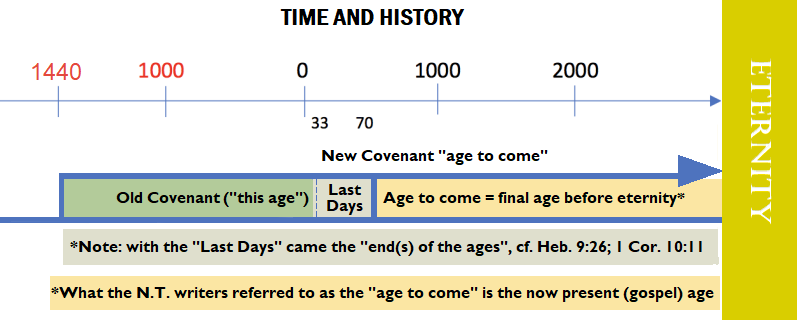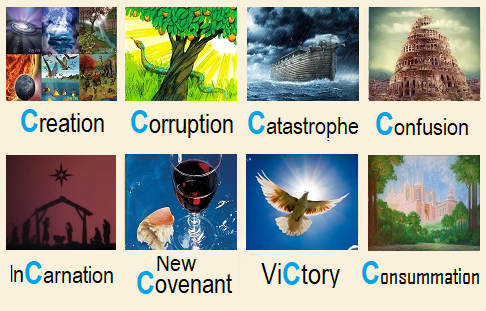
The above graphic depicts an understanding of the phrases “this age” and “the age to come”, in their biblical/historical context. This understanding underlies the proper perception of our present situation, and affects our eschatological outlook. Satan is NOT “the god of this age” that we are in now. He was “the god of this age” when Paul wrote 2 Cor. 4:4; Gal. 1:4; Rom. 16:20, etc. Jesus crushed Satan’s head and bound him in the first century, cf. Matt. 12:29; Luke 10:18; Rev. 20:2; etc. Not to say that the evil one is not still active other than in wholesale deception of the nations the way he was before, but the Lord Jesus Christ is reigning now! cf. Ps. 2; Ps. 110; Dan. 7:13-14; 1Cor. 15:25; etc.
An “age” is a period of time. There is no other age that will follow the present age of Christ’s mediatorial reign (what the New Testament, written prior to the termination of the Old Covenant age with the destruction of the temple, refers to as “the age to come”). We are now in the final age of time and history, as the ascended Lord Jesus Christ reigns in majesty on high at the right hand of the Father.
Premillennialists claim that there will be another age after Christ’s Second Coming, when He will reign upon the earth for 1,000 years prior to the final judgment, with a variety of flavors espousing a rebuilt temple, multiple mass physical resurrections, etc., etc. which is all patently unbiblical. An older version of postmillennialism taught that there will be a separate “golden age” in time and history after the present age and before the Second Coming; proponents of that view may have acquiesced to the lack of scriptural warrant for it.
Against “the age to come” as eternity
Ephesians 1:
17 that the God of our Lord Jesus Christ, the Father of glory, may give to you the spirit of wisdom and revelation in the knowledge of Him, 18 the eyes of your understanding being enlightened; that you may know what is the hope of His calling, what are the riches of the glory of His inheritance in the saints, 19 and what is the exceeding greatness of His power toward us who believe, according to the working of His mighty power 20 which He worked in Christ when He raised Him from the dead and seated Him at His right hand in the heavenly places, 21 far above all principality and power and might and dominion, and every name that is named, not only in this age (aion) but also in that which is to come.* 22 And He put all things under His feet, and gave Him to be head over all things to the church, which is His body, the fullness of Him who fills all in all. (NKJV)
*Note: the age “which is to come” in Ephesians 1 can hardly refer to eternity without conflicting with 1 Corinthians 15:
22 For as in Adam all die, even so in Christ all shall be made alive. 23 But each one in his own order: Christ the firstfruits, afterwards those who are Christ’s at His coming. 24 Then comes the end, when He delivers the kingdom to God the Father, when He puts an end to all rule and all authority and power. 25 For He must reign till He has put all enemies under His feet. 26 The last enemy that will be destroyed is death. 27 For “He has put all things under His feet.” But when He says “all things are put under Him,” it is evident that He who put all things under Him is excepted.
*28Now when all things are made subject to Him, then the Son Himself will also be subject to Him who put all things under Him, that God may be all in all.
The Ephesians passage presents the ages of time/history; the passage in 1 Corinthians presents the end: eternity. Jesus’ ascension took place in what were the last days of “this age” for the writers of the New Testament. In this final age now present (the “age to come” for the N.T. writers), Jesus is still reigning from on High and by His Spirit indwelling His people, living stones in a living temple, His body. He also rules over the nations with a rod of iron. This being the situation decreed for “not only in this age but also in that which is to come”, neither age can refer to the hereafter, as by contrast, in eternity, we shall eat and drink with Jesus Himself (cf. Matthew 26:29)! Our Forerunner will no longer be “far above”, having put an end to all rule and all authority and power; and we shall be like Him, for we shall see Him as He is (1 John 3:2)! The position of Christ the head and his body/bride the church will, at the end (in the eternity of final glory), be manifestly changed from that of the here and now, the age of the church militant (referred to as “the age to come” in Ephesians 1).
Paul wrote in the last days of the old covenant age when the temple was still standing. The “age to come”, which was then at hand, is fully here now: the gospel age, the “millennium” of the mediatorial reign of King Jesus.
In those same last days of the old covenant age when the temple was still standing, shortly before He suffered under Pontius Pilate, was crucified, died and was buried; rose again from the dead; and ascended into heaven, Jesus said to the high priest: “I say to you, hereafter you will see the Son of Man sitting at the right hand of the Power, and coming on the clouds of heaven.” (Matt. 26:64) The hereafter our Lord foretold is the termination of the old covenant economy with the destruction of the temple in AD 70, the final end of that age, the outworking of AD 30 when Christ made the once-for-all sacrifice of Himself; which was also foretold by the angel Gabriel to the prophet Daniel:
“And after the sixty-two weeks Messiah shall be cut off, but not for Himself; and the people of the prince who is to come shall destroy the city and the sanctuary. The end of it shall be with a flood, and till the end of the war desolations are determined. Then he shall confirm a covenant with many for one week; But in the middle of the week He shall bring an end to sacrifice and offering. And on the wing of abominations shall be one who makes desolate, Even until the consummation*, which is determined, Is poured out on the desolate.” (Daniel 9:26-27)
*i.e. the consummation of the ages, the transition from the Jewish to the Christian: the mediatorial kingdom of the gospel age, the final age before the end, the millennial reign of the risen, ascended Lord Jesus Christ as written of in Ephesians 1.

[click image to enlarge]

















